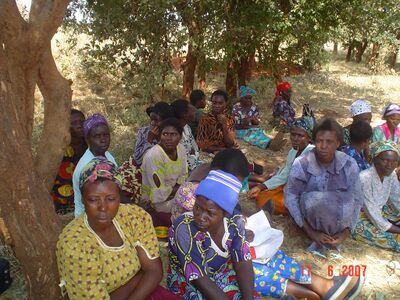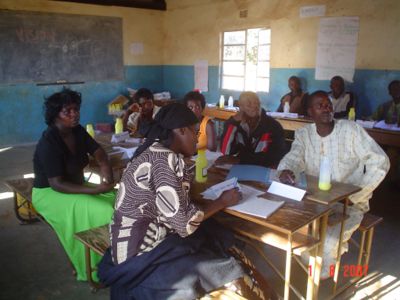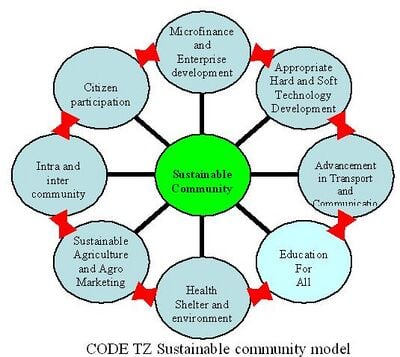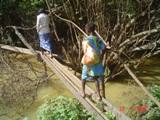COUNTRYSIDE DEVELOPMENT TRANSFORMATION ZAMBIA
OUR MISSION[edit | edit source]
The principal goal of the organisation is to promote and support integrated sustainable rural development. We aim at creating healthy, educated, advancing and self-sustaining communities in Zambia.
WHO WE ARE[edit | edit source]
Countryside Development Transformation Zambia (CODE TZ) is a non-governmental, not for profit, non-sectarian organisation formed in 2006 to foster sustainable community development.
OUR OPERATIONAL APPROACH[edit | edit source]
We believe that sustainable rural development can come by the way of the communities having access to and making use of resources, locating and utilising appropriately advanced technologies, accessing regenerative sources of information, and having meaningful networks and elaborate citizen participation in governance and development.
These are the major factors that can promote sustainable village-based communities' capacity for mobilising crucial resources and to launch poverty elimination programs. This, therefore, calls for creating platforms for Public-Private Partnerships (PPP) where all stakeholders in society are able to contribute their mighty towards accelerated rural development.
To achieve this kind of participation and sustainable development, it is only vital to take a progressive holistic community development approach to programme implementation. All relevant areas of community needs should be tackled (as concentration in one sector leaves several gaps) starting with the most needy sector. CODETZ shall, therefore, take such an approach and work with all relevant stakeholders.
OUR FUNDAMENTAL OPERATIONAL VALUES[edit | edit source]
We believe that we can easily achieve sustainable rural development if we work according to our values that are outlined below:
- Integrity
In all activities CODE TZ shall enhance objectivity, transparency and excellence.
- Equity and fairness
CODE TZ shall ensure that equality prevails. Where equality does not lead to fairness, equity shall be paramount.
- Innovation and creating
CODETZ shall promote innovation and creating. This will be the best way to advance technologically at all levels of the organisation. Along with innovation and creating is research.
- Accountability
All members of the community and employees working with CODETZ shall be accountable for every programme, trust, funds and so forth entrusted to them.
- Participation,
We believe that development prescription can not produce the rightful rural transformation if beneficiaries are not involved. Therefore participation of community members themselves is very important.
- Co-operation and networking
Bearing in mind that one individual, community or organisation can not work in isolation, CODETZ shall promote co-operation and networking.
OUR ORGANISATIONAL OBJECTIVES[edit | edit source]
The objectives of the Organisation shall be to Promote and develop, rural household livelihoods , citizen participation in development and governance, sustainable agriculture and food security, primary health care and hygiene, appropriate hard and soft technology use, appropriate rural communication and transport systems, education for all, and micro-credit and enterprises.
OUR PROGRAMMES[edit | edit source]
Sustainable Livelihoods
Countryside Development Transformation Zambia approach encompasses activities intended to help economically disadvantaged members of society meet their daily needs in a dignified, locally appropriate, and environmentally sustainable manner. Our definition of sustainable livelihood goes beyond ability to provide for basic amenities such as food, clothing and shelter to the ability to providing beyond local frontiers through commercialization of traditional resources. Eco-friendly shelter products and services as well as rural household and commercial energy requirements receive due attention.
Citizen participation in development and governance
CODE TZ promotes participation in development by all individuals in a community. This is done through the bottom-up participatory approach through community organizations. Residents visualise and implement what they want in their communities and have access to and control of the necessary resources to improve their livelihoods. This is done through:
- Local leadership development,
- Community organisation and mobilisation,
- Technical capacity building,
- Resource mobilisation; and
- Networking with all stakeholders.

Sustainable agriculture and agro marketing
CODE TZ works to enhance household food security in rural communities. CODE TZ stands to promote crop and produce marketing, food processing, use of sustainable tillage and storage practices, capacity building, increased and diversified crop production, water utilization techniques and, local and external partnerships.
Primary health care and hygiene
CODE TZ main areas of concern in health include: reproductive Health, nutrition, environmental, HIV/AIDS, water, child health[edit | edit source]
- ==== Reproductive Health ====
This involves safe motherhood and management of sexually transmitted infections and prevention of mother to child transmission (STI/PMTCT). It encompasses Antenatal Care / PMTCT Program, Clean/safe deliveries, Essential obstetric Care, and Family Planning. Our approaches include promotion of quality of care, capacity building, and infrastructure development, participation of communities, mobility facilitation, information publication and resources mobilisation.
- ==== Nutrition Health ====
Areas of concern include: Growth Monitoring and Nutrition Education. Prevention of Protein-energy malnutrition, conduct deworming exercises and the promotion of Breastfeeding programs. Promotion of micronutrients such as Iodine and Vitamin A supplementation programs, horticulture promotion, and sustainable household food security enhancement. All these shall be Community Based.
- ==== Environmental Health ====
CODETZ major areas of concern in environmental health shall be centred on Water and Sanitation and housing. Our objectives on the water and sanitation are centred on increasing access to clean and safe water supplies, improving sanitation and hygiene practices and improving housing.
- Natural Disasters and HIV/AIDS
Natural calamities occur without warning. CODE TZ shall within its operational boundaries work with other partners to mitigate disasters. HIV / AIDS has affected many families in Zambia and the world over. CODE TZ shall work to raise awareness, initiate workable programmes for orphaned and vulnerable children, and promote sustainable livelihood programmes for people living with HIV/AIDS. CODE TZ will also foster research in its communities on HIV / AIDS.
Appropriately advanced technology
Appropriate technology advances local development by providing a solution that fuses village human and natural resources and goals within the local culture. It is the policy of CODE TZ to promote appropriate technology. Appropriate technology refers to the skills, knowledge and procedures for making, using and doing useful things, while making optimum use of human, natural, and person-made resources in the village – with ‘optimum’ determined on a community-specific basis by the community members themselves. There are two levels of technology which are; hard and soft that should complement each other.
CODE TZ believes that a combination of hard and soft technologies will enable communities to successfully implement capacity building and community development programs, which fuels the continual redevelopment of newer and better forms of appropriate technologies in a process known as Continuous improvement.
Transport and communication systems
Rural transport is one of the most significant means of ensuring that those who live in rural areas have access to markets for their products and to social services. Our transport and communication objectives are to:
- Upgrade traditional transport technology,
- Empower local communities to operate commuting and goods movement systems.
- Empower local entrepreneurs to operate communication systems ideal for development.
- Provide avenues for local communities to broadcast and share development ideas, information and the related.
Education for all
CODE TZ’s educational goal is to improve access and quality of education for all. Main areas of concern shall encompass early childhood, basic, and adult literacy. The major focus points in education are:
- Community participation in education provision
Parents, the community at large and Children are the major stakeholders in education,
hence they need to be involved in all aspects of their education.
- Education quality Support
The focus on education quality support will encompass all activities that are aimed at uplifting all aspects of schooling. Education quality support has three major components, which are; Teacher development and certification, Learning/teaching aids provision and infrastructure development.

Microfinance
CODE TZ values sustainable microfinance as a critical anti-poverty tool and a wise investment in human capital that can restore to people control over their own lives and destinies. CODE TZ’s main microfinance themes include:
- reaching the poorest,
- reaching and empowering women,
- building financially self-sufficient households, and
- having a positive, measurable impact on the lives of the clients and their families.
CODE TZ main microfinance objectives include:
- Working to have three quarters of Zambia’s poorest households, especially the women headed ones of those families, are receiving credit for self-employment and other financial and business services by the end of 2020.
- Working to have three quarters of Zambia's poorest families move from below US$1 a day adjusted for purchasing power parity (PPP) to above US$1 a day adjusted for PPP by the end of 2020.
Micro enterprises
CODE TZ shall work to develop entrepreneurship among the countryside dwellers. We believe that if opportunities are availed irrespective of constraints and hazards, poor people could rise above poverty and make local wealth. Our main micro enterprise objectives are to:
- Promote the use of locally available resources and opportunities to develop entrepreneurs,
- Promote use of constraints to support local businesses,
Strategies to achieving this will vary from community to community but the broad ones include the following:
- Capacity building,
- Widening local resources base,
- Building resource linkages,
- Micro credit promotion,
- Market research and creation.

COVERAGE AREAS[edit | edit source]
We are currently operating in Mubamba, Shangala, Ndendula and Njaluka villages in Chibombo district off Mumbwa road that make the Mubamba unit and Shamakamba, Shampule, Mweshakembe, Mumba and Mukuni villages in Kafue district that make up the Shampule unit. Broadly, our operation districts are Chibombo, and Kafue in Zambia.
- Mubamba area
The major challenges in the Mubamba area include:
-
- Unavailability of medical care facilities.
- Long distances to schools for children,
- Deforestation as charcoal burning is the major source of income
- Long distance to clinics
- Limited sources of income
- Inadequate safe water supplies and sanitation.
- Low application of appropriate technology
- Insufficient sources of income
- Difficulties in crossing rivers

- Shampule Area
- Long distance to clinic
- Insufficient safe water sources
- Poor sanitation
- Inadequate sources of energy
- Insufficient sources of income
- Low application of appropriate technology
CODE TZ is working with stakeholders that include the communities to address these issues. Each community has its own leadership chosen from within its members.
